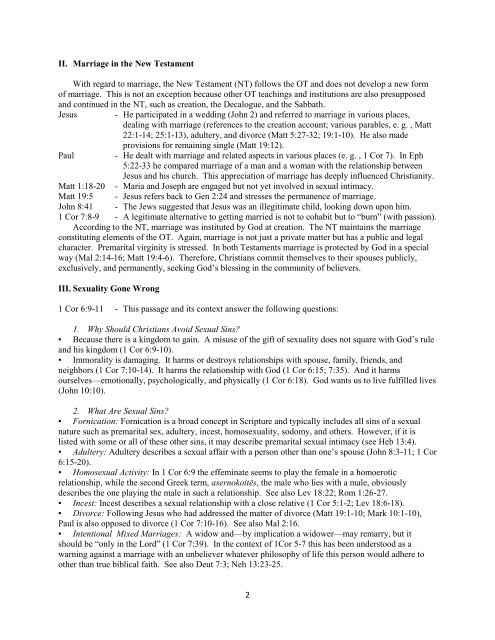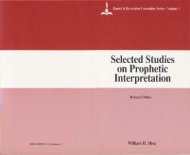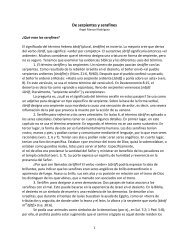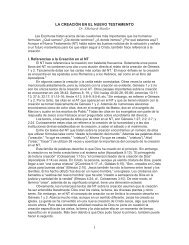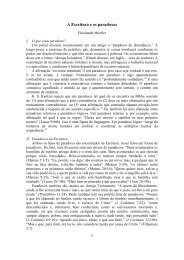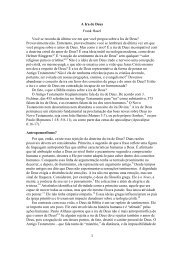Read Document - Biblical Research Institute
Read Document - Biblical Research Institute
Read Document - Biblical Research Institute
Create successful ePaper yourself
Turn your PDF publications into a flip-book with our unique Google optimized e-Paper software.
II. Marriage in the New Testament<br />
With regard to marriage, the New Testament (NT) follows the OT and does not develop a new form<br />
of marriage. This is not an exception because other OT teachings and institutions are also presupposed<br />
and continued in the NT, such as creation, the Decalogue, and the Sabbath.<br />
Jesus - He participated in a wedding (John 2) and referred to marriage in various places,<br />
dealing with marriage (references to the creation account; various parables, e. g. , Matt<br />
22:1-14; 25:1-13), adultery, and divorce (Matt 5:27-32; 19:1-10). He also made<br />
provisions for remaining single (Matt 19:12).<br />
Paul - He dealt with marriage and related aspects in various places (e. g. , 1 Cor 7). In Eph<br />
5:22-33 he compared marriage of a man and a woman with the relationship between<br />
Jesus and his church. This appreciation of marriage has deeply influenced Christianity.<br />
Matt 1:18-20 - Maria and Joseph are engaged but not yet involved in sexual intimacy.<br />
Matt 19:5 - Jesus refers back to Gen 2:24 and stresses the permanence of marriage.<br />
John 8:41 - The Jews suggested that Jesus was an illegitimate child, looking down upon him.<br />
1 Cor 7:8-9 - A legitimate alternative to getting married is not to cohabit but to “burn” (with passion).<br />
According to the NT, marriage was instituted by God at creation. The NT maintains the marriage<br />
constituting elements of the OT. Again, marriage is not just a private matter but has a public and legal<br />
character. Premarital virginity is stressed. In both Testaments marriage is protected by God in a special<br />
way (Mal 2:14-16; Matt 19:4-6). Therefore, Christians commit themselves to their spouses publicly,<br />
exclusively, and permanently, seeking God’s blessing in the community of believers.<br />
III. Sexuality Gone Wrong<br />
1 Cor 6:9-11 - This passage and its context answer the following questions:<br />
1. Why Should Christians Avoid Sexual Sins<br />
▪ Because there is a kingdom to gain. A misuse of the gift of sexuality does not square with God’s rule<br />
and his kingdom (1 Cor 6:9-10).<br />
▪ Immorality is damaging. It harms or destroys relationships with spouse, family, friends, and<br />
neighbors (1 Cor 7:10-14). It harms the relationship with God (1 Cor 6:15; 7:35). And it harms<br />
ourselves—emotionally, psychologically, and physically (1 Cor 6:18). God wants us to live fulfilled lives<br />
(John 10:10).<br />
2. What Are Sexual Sins<br />
▪ Fornication: Fornication is a broad concept in Scripture and typically includes all sins of a sexual<br />
nature such as premarital sex, adultery, incest, homosexuality, sodomy, and others. However, if it is<br />
listed with some or all of these other sins, it may describe premarital sexual intimacy (see Heb 13:4).<br />
▪ Adultery: Adultery describes a sexual affair with a person other than one’s spouse (John 8:3-11; 1 Cor<br />
6:15-20).<br />
▪ Homosexual Activity: In 1 Cor 6:9 the effeminate seems to play the female in a homoerotic<br />
relationship, while the second Greek term, asernokoitēs, the male who lies with a male, obviously<br />
describes the one playing the male in such a relationship. See also Lev 18:22; Rom 1:26-27.<br />
▪ Incest: Incest describes a sexual relationship with a close relative (1 Cor 5:1-2; Lev 18:6-18).<br />
▪ Divorce: Following Jesus who had addressed the matter of divorce (Matt 19:1-10; Mark 10:1-10),<br />
Paul is also opposed to divorce (1 Cor 7:10-16). See also Mal 2:16.<br />
▪ Intentional Mixed Marriages: A widow and—by implication a widower—may remarry, but it<br />
should be “only in the Lord” (1 Cor 7:39). In the context of 1Cor 5-7 this has been understood as a<br />
warning against a marriage with an unbeliever whatever philosophy of life this person would adhere to<br />
other than true biblical faith. See also Deut 7:3; Neh 13:23-25.<br />
2


